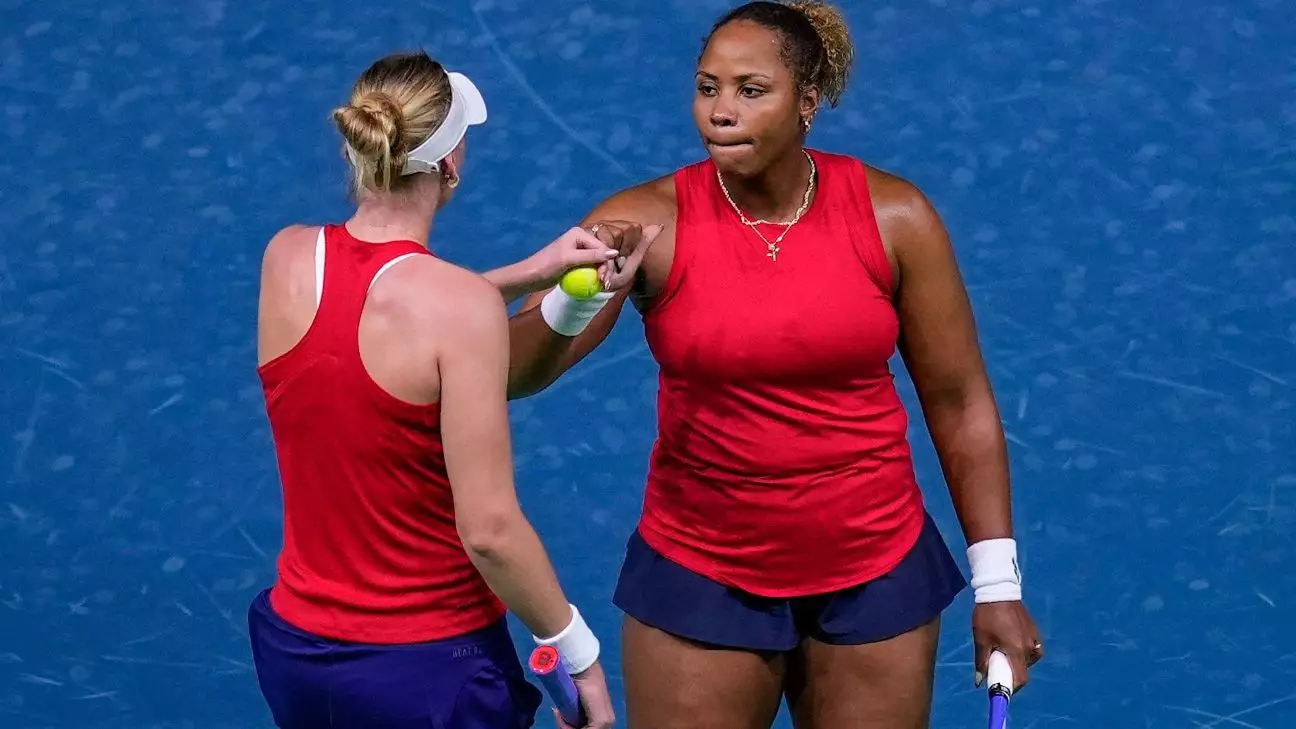In a gripping encounter held in Malaga, Spain, the United States women’s tennis team met a fierce challenge from Slovakia in the opening round of the Billie Jean King Cup Finals. The match initially showcased promise for the U.S. after Ashlyn Krueger and Taylor Townsend displayed remarkable resilience, saving six match points during the decisive doubles contest. Despite their determination and a gallant comeback from a daunting 9-2 deficit in the final set, the duo ultimately fell short, succumbing to Slovakia with a scoreline of 6-3, 3-6, 10-8. This heartbreaking loss not only ended the U.S.’s campaign in the tournament but also exemplified the intensity of this prestigious competition.
The atmosphere was electric as Townsend, who secured the first point for the U.S. by overcoming the young Renata Jamrichova, seemed to set the stage for a successful tournament. In a tightly contested match, she clinched victory with a score of 7-5, 6-4. However, the momentum shifted when Rebecca Sramkova rallied to defeat Danielle Collins in straight sets, leveling the competition and leading to the decisive doubles showdown that would determine the outcome for the American squad.
Slovakia’s team, led by the steady performance of Tereza Mihalikova and Viktoria Hruncakova, illustrated the unpredictability of the sport as they secured their place in the quarterfinals. Their ability to maintain composure under pressure was commendable, and the thrilling finish underscored the skill and determination inherent in elite women’s tennis. Slovakia is now set to face the formidable Australian team, a matchup that promises to be packed with excitement and competition as both squads strive for a place in the semifinals.
Meanwhile, the defeat of the U.S. team raises various questions about its composition and strategy moving forward. The experience of both Krueger and Townsend will be invaluable as they assess their performance, reflecting on the critical moments that marked the match. With several emerging young talents in women’s tennis, the U.S. must find a balance between seasoned players and fresh faces who can contribute to future successes on the international stage.
In a pivotal moment for Japan, the team marked its presence in the quarterfinals for the first time since 2013. Eri Hozumi and Shuko Aoyama’s decisive victory over Monica Niculescu and Elena-Gabriela Ruse illustrated Japan’s potential and determination. Their victory came on the heels of a one-sided loss experienced by Nao Hibino against Ana Bogdan, underscoring the unpredictable nature of tournament play.
Japan’s resilience was on full display as Ena Shibahara leveled the tie by fighting back to win her match against Jaqueline Cristian. With such spirited performances, Japan will face Italy in an enticing quarterfinal that holds great anticipation for fans of the sport.
The Billie Jean King Cup’s execution wasn’t without its challenges. Severe weather prompted delays that significantly affected match schedules, including a two-hour postponement for the first match between Japan and Romania. Moreover, recent natural disasters in the Valencia region put a collective perspective on the event, reminding participants and fans alike of the importance of resilience outside the realm of sports. The International Tennis Federation responded by contributing to relief strategies, while players like Paula Badosa pledged to support recovery efforts through their prize earnings.
These circumstances highlight the connections between sports and community, emphasizing the role of athletes as not only competitors but also philanthropic figures who can leverage their platform for positive impact.
As the Billie Jean King Cup Finals progress, both the competitive spirit and emotional narratives unfolding on the court showcase the depth of talent within women’s tennis. With the tournament’s commitment to equality in prize money further promoting gender parity in sports, the future looks bright. The interwoven tales of determination, heartbreak, and triumph inspire both players and fans to remain engaged in the evolving landscape of women’s tennis. Each match unfolds with the promise of new stories, reinforcing the notion that resilience inspires hope, not just in sports but in life itself.

